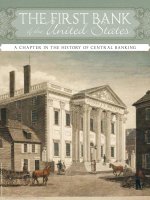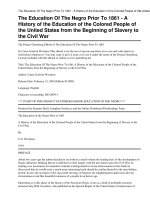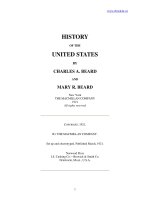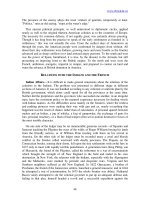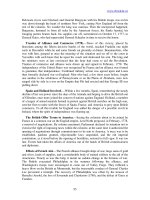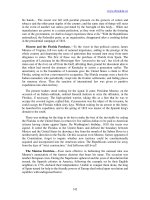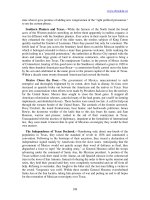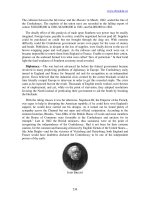American stories a history of the united states combined volume 1 and 2 1st edition brands test bank
Bạn đang xem bản rút gọn của tài liệu. Xem và tải ngay bản đầy đủ của tài liệu tại đây (251.21 KB, 9 trang )
American Stories (Brands/Breen/Williams/Gross)
Chapter 2 England's New World Experiments, 1607-1732
2.1 Multiple-Choice Questions
1) English settlers in seventeenth-century America could be characterized best in terms of their
A) striking social diversity.
B) similarity to French and Spanish migrants of the same period.
C) unity of purpose and motivation.
D) desire to help each other.
E) homogeneity.
Answer: A
Page Ref: 32
2) Which one of the following was NOT a factor that stimulated English migration to the New World?
A) religious disagreements in England
B) poverty or the fear of falling into poverty
C) a desire for land ownership
D) government laws that forced the migration of the poorer classes
E) rapid population growth
Answer: D
Page Ref: 33
3) Upon arriving in the New World, English settlers
A) quickly abandoned English beliefs and values.
B) generally adapted old beliefs to the new environment.
C) rarely were forced to significantly change their old English ways.
D) usually adopted the customs of the local Indian tribes as a way to survive.
E) immediately focused on converting the Native Americans.
Answer: B
Page Ref: 33
4) To resolve the problem of the vast expenses New World settlement required, English merchant-capitalists
introduced the concept of
A) proprietorship.
B) primogeniture.
C) the joint-stock company.
D) feudalism.
E) mercantilism.
Answer: C
Page Ref: 34
5) The joint-stock company
A) required large capital investment.
B) promised immense wealth to investors.
C) encouraged investment in colonial enterprises, with "limited liability" for the investors.
D) was not required to obtain a royal charter.
E) proved to be a failure in providing capital for colonization.
Answer: C
Page Ref: 34
10
Copyright © 2009 Pearson Education, Inc., Upper Saddle River, NJ 07458. All rights reserved.
6) The ________ Company was responsible for the settlement of Jamestown in Virginia.
A) New England
B) Royal African
C) Virginia
D) American
E) New World
Answer: C
Page Ref: 34
7) In which one of the following were religious reasons the least important in explaining the founding of that
colony?
A) Massachusetts
B) Rhode Island
C) Maryland
D) Virginia
E) Pennsylvania
Answer: D
Page Ref: 34
8) The selection of a site for Jamestown was primarily based on the settlers'
A) fear of surprise attacks.
B) desire for a healthful place to live.
C) belief that friendly Indians lived nearby.
D) need for close proximity to the open ocean.
E) fear of diseases in the swamps.
Answer: A
Page Ref: 35
9) Jamestown might have gone the way of Roanoke had it not been for the perseverance of
A) John Winthrop.
B) Captain John Smith.
C) Pocahontas.
D) Richard Hakluyt.
E) Cotton Mather.
Answer: B
Page Ref: 35
10) The first three years of Jamestown's history witnessed
A) terrible hardship and suffering.
B) the discovery of gold and silver.
C) successful attempts at growing many profitable crops.
D) the establishment of a representative form of government.
E) the erection of the first Christian church in North America.
Answer: A
Page Ref: 35-36
11
Copyright © 2009 Pearson Education, Inc., Upper Saddle River, NJ 07458. All rights reserved.
11) Jamestown's prosperity was ensured by
A) the discovery of gold.
B) the development of fur trading.
C) royal financial support.
D) tobacco cultivation.
E) potato cultivation.
Answer: D
Page Ref: 37
12) The man who taught Virginians how to grow tobacco was
A) Captain John Smith.
B) Powhatan.
C) John Rolfe.
D) Sir Edwin Sandys.
E) the Duke of Marlboro.
Answer: C
Page Ref: 37
13) The attitude of King James I toward tobacco
A) demonstrated his concern for the health of his people.
B) showed that, in the end, he valued revenue more than good health.
C) changed very little during the course of his reign.
D) was strongly influenced by his own habit of smoking.
E) was influenced by its religious usage.
Answer: B
Page Ref: 37
14) Under the "headright" system in Virginia,
A) every adult male could vote.
B) every child was guaranteed a primary education.
C) all new arrivals who had paid their trans-Atlantic fares received 50-acre land grants.
D) new immigrants were guaranteed a year's provisions.
E) every new settler was entitled to one slave.
Answer: C
Page Ref: 37-38
15) After 1618, the Virginia Company's principal means of attracting new settlers was
A) the granting of religious freedom.
B) liberal suffrage requirements.
C) a system of land grants.
D) payment of passage by the company.
E) impressment.
Answer: C
Page Ref: 38
16) Indentured servants
A) were working off the cost of their passage to America.
B) all served the same number of years regardless of age or experience.
C) had no more legal rights than slaves.
D) received grants of land when their terms were up.
E) usually lived long enough to complete their terms of service.
Answer: A
Page Ref: 38
12
Copyright © 2009 Pearson Education, Inc., Upper Saddle River, NJ 07458. All rights reserved.
17) Those who migrated to the Chesapeake Bay area as indentured servants were
A) usually from the dregs of English society.
B) English farmers who saw a better future in the New World.
C) normally single, lower-class males in their teens or early twenties.
D) married individuals who came with their families.
E) generally convicted criminals who traded jail time in England for indentures.
Answer: C
Page Ref: 38
18) In which one of the following colonies was the death rate for the early colonists the most severe?
A) Massachusetts
B) New York
C) Rhode Island
D) Virginia
E) Pennsylvania
Answer: D
Page Ref: 38-39
19) In 1622, the Native American tribes of Virginia
A) attacked the English settlements.
B) formed an alliance with the Native American tribes of New England.
C) established permanently good relations with the English settlers.
D) learned from the English settlers how to grow tobacco.
E) migrated westward to avoid future contact with settlers.
Answer: A
Page Ref: 39
20) In 1624, Virginia became
A) an independent commonwealth.
B) a proprietary colony.
C) a royal colony.
D) part of Maryland.
E) the primary destination for female settlers.
Answer: C
Page Ref: 39
21) The individual largely responsible for Maryland's settlement was
A) Sir George Calvert.
B) William Penn.
C) Sir Edwin Penn.
D) Richard Hakluyt.
E) Sir Walter Ralegh.
Answer: A
Page Ref: 39
22) Initially, Lord Baltimore intended that Maryland be a haven for
A) Quakers.
B) Puritans.
C) Catholics.
D) Baptists.
E) Separatists.
Answer: C
Page Ref: 40
13
Copyright © 2009 Pearson Education, Inc., Upper Saddle River, NJ 07458. All rights reserved.
23) Lord Baltimore's settlement in Maryland
A) became a successful feudal outpost in America.
B) declared war on Virginia in 1639.
C) never succeeded in becoming a feudal society.
D) became a haven for persecuted Protestants.
E) was a total failure.
Answer: C
Page Ref: 40
24) Unlike their southern counterparts, the first Englishmen who established colonies in New England were
A) in search of land and riches.
B) religious refugees.
C) Catholic missionaries.
D) wealthy aristocrats, hoping to establish a feudal system in America.
E) commercial traders.
Answer: B
Page Ref: 42
25) The Pilgrims, who left Holland to settle in America,
A) were non-Separatists.
B) did so because they believed that their way of life was being undermined by the ways of their Dutch
hosts.
C) had few alternatives because they were being harassed by the Dutch government.
D) arrived in Virginia, even though their destination was Massachusetts Bay.
E) were Catholic radicals.
Answer: B
Page Ref: 42
26) The document in which the Pilgrims established a civil government for their Plymouth colony has become
known as the
A) Bill of Rights.
B) Mayflower Compact.
C) Statement of Principles.
D) Cambridge Agreement.
E) Plymouth Agreement.
Answer: B
Page Ref: 42
27) Seventeenth-century English Puritans
A) were only a tiny minority of all Englishmen.
B) were individuals committed to significant institutional change.
C) were firmly supportive of the status quo.
D) accepted the tenets of Catholicism with only a few reservations.
E) were neurotic and self-righteous.
Answer: B
Page Ref: 43
14
Copyright © 2009 Pearson Education, Inc., Upper Saddle River, NJ 07458. All rights reserved.
28) King Charles I disbanded Parliament in 1629 because he could not deal with intense criticism from the
A) Puritans.
B) Baptists.
C) Catholics.
D) Anglicans.
E) Presbyterians.
Answer: A
Page Ref: 44
29) The Puritans of Massachusetts Bay believed that the best way to reform the Church of England was to
A) separate from it and reform it from the outside.
B) rely on help from the English monarchy.
C) remain in the Church and reform it from the inside.
D) refuse to associate with it in any way.
E) actively work to destroy the tenets with which they disagreed.
Answer: C
Page Ref: 44-45
30) In 1636, authorities in Massachusetts Bay banished Roger Williams because of
A) his conversion to Roman Catholicism.
B) his bitter hostility toward the Native Americans.
C) his defense of Native American rights and his demand for separation of church and state.
D) his desire to launch a new colony in Connecticut.
E) his crass pursuit of profit.
Answer: C
Page Ref: 47
31) Puritan dissenter Roger Williams established the colony of
A) New York.
B) Connecticut.
C) Rhode Island.
D) Maryland.
E) New Jersey.
Answer: C
Page Ref: 47
32) Anne Hutchinson's skillful self-defense at her trial before the magistrates of Massachusetts Bay was ruined
by
A) her affinity for the dictum of works.
B) her claim of personal revelation.
C) her reliance on the Scriptures.
D) her rejection of free grace.
E) the fact that she was female.
Answer: B
Page Ref: 47
15
Copyright © 2009 Pearson Education, Inc., Upper Saddle River, NJ 07458. All rights reserved.
33) Because of its policy of religious toleration, ________ attracted unusual numbers of independent-minded
people.
A) Maryland
B) Connecticut
C) Pennsylvania
D) New York
E) Rhode Island
Answer: E
Page Ref: 48
34) The English takeover of New Netherland (which was subsequently renamed New York)
A) had little immediate effect on the colony.
B) was followed by the expulsion of the Dutch.
C) led to the prompt creation of a legislature.
D) met with armed resistance by the Dutch.
E) sparked a war between the English and the Dutch.
Answer: A
Page Ref: 50-51
35) Seventeenth-century Quakers were known for their
A) aggressive and overbearing personalities.
B) belief in personal humility and pacifism.
C) concept of predestination.
D) unwillingness to seek the conversion of other individuals to their faith.
E) belief in the necessity of an educated clergy.
Answer: B
Page Ref: 51-52
36) The man most responsible for the survival of Carolina was
A) James Oglethorpe.
B) John Winthrop.
C) Captain John Smith.
D) William Penn.
E) Anthony Ashley Cooper.
Answer: E
Page Ref: 53
37) The colony of Pennsylvania was established as a religious sanctuary for
A) Puritans.
B) Catholics.
C) Baptists.
D) Quakers.
E) Presbyterians.
Answer: D
Page Ref: 53
16
Copyright © 2009 Pearson Education, Inc., Upper Saddle River, NJ 07458. All rights reserved.
38) Large numbers of the first English settlers in the Carolinas came from
A) Ireland.
B) Barbados.
C) Rhode Island.
D) Jamaica.
E) the Virgin Islands.
Answer: B
Page Ref: 54
39) The main staple of the Carolina colonies' economy by the close of the seventeenth century was
A) rice.
B) cotton.
C) tobacco.
D) timber.
E) indigo.
Answer: A
Page Ref: 55
40) To its founding leaders, ________ would be a "City on a Hill."
A) Massachusetts
B) Rhode Island
C) Connecticut
D) Maryland
E) Pennsylvania
Answer: A
Page Ref: 55
2.2 True/False Questions
1) The only real reason for the migration of thousands of English men and women to the New World was greed
for material gain.
Answer: FALSE
Page Ref: 32
2) The lives of New Englanders differed considerably from those of their Chesapeake counterparts.
Answer: TRUE
Page Ref: 32
3) Had seventeenth century England not been prosperous and at peace with itself, it could not have populated
its new colonies.
Answer: FALSE
Page Ref: 33
4) From its very inception, the Jamestown colony was a success.
Answer: FALSE
Page Ref: 35-37
5) The Puritans were a highly neurotic religious group that condemned liquor and sex.
Answer: FALSE
Page Ref: 43
17
Copyright © 2009 Pearson Education, Inc., Upper Saddle River, NJ 07458. All rights reserved.
6) Colonial Massachusetts was wracked with chronic religious discord.
Answer: FALSE
Page Ref: 46
7) The Fundamental Orders were the blueprint for government in colonial Connecticut.
Answer: TRUE
Page Ref: 48
8) Because of New York's ethnic diversity, the English cautiously asserted their hegemony over the area.
Answer: TRUE
Page Ref: 50-51
9) William Penn went to great lengths to make Pennsylvania into an efficient and prosperous colony.
Answer: TRUE
Page Ref: 53
10) Many of the first Carolina settlers came there from Barbados.
Answer: TRUE
Page Ref: 54
2.3 Essay Questions
1) What problems did early settlers in Virginia have to overcome? What factors attracted settlers to that area?
Page Ref: 33-39
2) How did religious differences influence the founding and development of the New England colonies?
Page Ref: 42-49
3) Analyze the dynamic between religious and economic motivations in the establishment and development of
the English colonies in the seventeenth century?
Page Ref: 31-57
18
Copyright © 2009 Pearson Education, Inc., Upper Saddle River, NJ 07458. All rights reserved.


